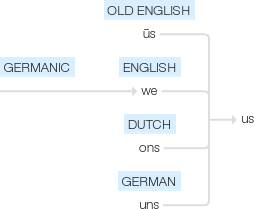Us
Old English ūs, accusative and dative of we, of Germanic origin; related to Dutch ons and German uns .
wiktionary
From Middle English us, from Old English ūs(“us”, dative personal pronoun), from Proto-Germanic *uns(“us”), from Proto-Indo-European *ne-, *nō-, *n-ge-, *n̥smé(“us”). Cognate with Saterland Frisian uus(“us”), West Frisian us, ús(“us”), Low German us(“us”), Dutch ons(“us”), German uns(“us”), Danish os(“us”), Latin nōs(“we, us”).
Derived from the similarity between the letter u and the Greek letter µ.
us
etymonline
us (pron.)
Old English us (cognate with Old Saxon, Old Frisian us, Old Norse, Swedish oss, Dutch ons, German uns), accusative and dative plural of we, from PIE *nes- (2), forming oblique cases of the first person plural personal pronoun (source also of Sanskrit nas, Avestan na, Hittite nash "us;" Greek no "we two;" Latin nos "we, us;" Old Church Slavonic ny "us," nasu "our;" Old Irish ni, Welsh ni "we, us"). The -n- is preserved in Germanic in Dutch ons, German uns.
US
also U.S., abbreviation of United States, attested from 1834. U.S.A. for "United States of America" is recorded from 1885; before that it generally meant "U.S. Army."
